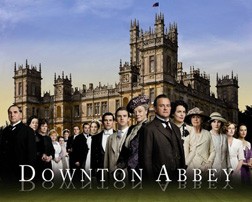Doorton Abbey
- Share
- Tweet
- Pin
- Share

Lady Thompson appreciates the drama of 20th century England.
When I was handed a set of Downton Abbey DVDs on Christmas morning, I was skeptical. When my mother coerced me to watch an episode, I was hooked.
Downton Abbey is a guilty pleasure – like Jersey Shore if the characters had impeccable posture and scandal peaked with a man sneaking into a lady’s bedroom. But because Downton is basically a gussied-up grammar lesson and aired on PBS, I’m not ashamed of my obsession.
For those who don’t know, Downton Abbey is a popular show about the Crawley family, British aristocrats who live in Downton Abbey during the tumultuous times of World War 1. They’re the original “job creators” who see it as their duty to provide employment by paying servants to bring tea at the ring of a bell.
Classic and modern struggles wash over the Crawley family, who at first struggle to find a male heir to take over Downton and marry off their oldest daughter to the most eligible (read: wealthy) bachelor. Modern problems pile on, as feminists stomp on the toes of a patriarchal society, class structure crumbles, old money is lost and new money shakes up the ranks of the elite.

But I fear Downton is taking a toll on my already marginal social life. I’ve perfected the art of masking snark with a smile, which doesn’t seem to make one too popular on a Saturday night. I drink so much tea my teeth are turning a different, non-flattering color. I may even call new friends “Lord This” and “Lady That” by accident.
And all week I look forward to the two hours I get to plop down on my Papasan chair, brew a pot of Earl Grey, and get transported to a world where you change clothes before dinner and look down on women with careers. I’ve turned down precious social invitations to watch these high-society Brits get their 20th century romance on.
Don’t get me wrong, I’m happy to live in the real world, drink coffee and pretend to watch football as much as I ever was. Just not on Sundays at 8 pm.

